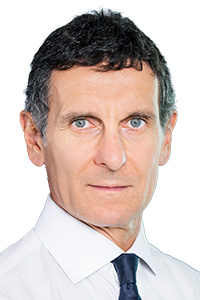Following our head-to-head Paris discussion Funds Europe spoke to two more major French industry leaders at Amundi and Axa IM. Topics for discussion included the ‘new abnormal’ business environment, ESG and the success of French funds.
When Funds Europe last hosted the ‘France CEO roundtable’ in 2012, it was in a period frequently referred to as the ‘new normal’, as Europe relied on quantitative easing to try and recover from the financial meltdown of 2008.
There was at least some semblance of normality: the UK was still part of the EU, the investment case for China appeared solid, and inflation was in single digits. This has since completely changed.
Funds Europe spoke with Valérie Baudson, chief executive of Amundi, and Marco Morelli, executive chairman of Axa Investment Managers. We started by asking if the new normal of a decade ago has become the ‘new abnormal’, and where this left asset management.
“Previously, the ‘new normal’ was characterised by low nominal growth, loose monetary policy and a final phase of globalisation,” said Amundi’s Baudson.
But this regime is now challenged, she says, by inflation and central bank monetary tightening; and by ‘regionalisation’ – or the reshoring of production that affects linkages in trade between countries.
“What we see today is that while the seeds of the regime change were previously sown, three main drivers are exacerbating it: climate change, Covid and the war in Ukraine.”
“What we see today is that while the seeds of the regime change were previously sown, three main drivers are exacerbating it: climate change, Covid and the war in Ukraine. We are transitioning to a new regime which still needs to be defined in macroeconomics, policy mix and geopolitical terms.”
The “new abnormal”, Baudson says, could be characterised by “a new policy mix, higher volatility in markets, increased geopolitical risks and social and political uncertainties coupled with the energy transition, which requires significant investments over a long period”.
This will be the new landscape that asset managers must navigate, says the CEO.
Along with higher volatility in financial markets as central banks tighten rates, asset managers also face positive correlations between returns linked to high levels of inflation. A major change in the asset management market, says Baudson, is the level of long and short-term interest rates. Money market funds are now generating positive returns and bond yields are back to attractive levels, despite negative real yields over the shorter term.
She says to achieve diversification, there is a greater role for real asset and investment strategies built around uncorrelated or lowly correlated returns.
“What I would add, though, is that while the current environment is fraught with geopolitical risks and macroeconomic headwinds, significant supportive long-term trends will continue to drive growth in the asset management industry going forward: the retirement savings gap of an ageing population, the large pool of retail savings in cash, continued energy transition financing needs and the rise of the middle class in Asia. Asset managers will need to keep pace with these changes to remain relevant and thrive.”
Morelli says that how investors invest in a high inflation context across the major Western economies is an ongoing focus with no consensus around how quickly inflation will come down.
“While the global market environment might seem less supportive to M&A transactions in the short term, those broad trends have been confirmed by recent market volatility and the pressure on managers to follow through with consolidation remains high.”
Also in focus is how companies, particularly consumer-facing businesses, seek to behave towards their customers wrestling with rising living costs.
“Alternative asset classes offer a good hedge to inflation due to revenues indexation, especially in sectors supported by positive megatrends and a large part of the private debt and alternative credit universe is on a floating rate basis,” Morelli says.
UK economic activity contracted at its fastest pace in almost two years in October 2022, suggesting it is already in recession. Meanwhile, Europe faces a potentially severe recession and questions remain over whether there will be a hard landing in the US, says Morelli.
In this environment, a key question for him is about whether growth equities can stage a sustained comeback at a time when value investing and commodities are doing well.
Consolidation to continue
Against this backdrop, the pressure on asset managers for consolidation remains high, says Morelli. In recent years, the pursuit of efficiencies to contend with fee pressure, and the acquisition of higher-yielding investment capability, were main drivers for consolidation.

“While the global market environment might seem less supportive to M&A transactions in the short term, those broad trends have been confirmed by recent market volatility and the pressure on managers to follow through with consolidation remains high.”
Therefore, there will likely be no reduction in the appetite for alternatives – which Morelli says firms have purchased “even at high multiples” in the past. But how firms enter the alternatives space and who they hire are key questions at a time of “talent wars” and wage inflation.
He adds: “At the other end of the scale, private equity is increasingly seeking to enter the retail market. Will their customers, as some in the media are suggesting, end up with a lesser version of what is available to institutional investors?”
In more traditional assets, Morelli highlights that active ETFs will grow because firms want to offer investors “optionality in terms of fund structure and flexibility”.
He adds: “The transparency they offer could become something of a dividing line, as those embracing full portfolio disclosure could steal a march on those unwilling to be as open, particularly in the ESG space.”
Similarly, ESG is a factor in the rise of thematic funds. “Where only a few years ago many wealth managers were sceptical about the place of thematics in portfolios, now they have become more mainstream, with fewer questions around how they are deployed in portfolios based on traditional regional and asset class allocations.”
“Positive” growth crisis
French asset managers are among the leaders in the move towards ESG, with Paris being almost synonymous with ‘net zero’. Is the current energy crisis a fundamentally negative factor in global asset management’s ability to aid in net zero and in other aligned climate initiatives?
Baudson – who says the “very strong performance of socially responsible and green funds as a whole in 2020 and 2021” is a factor in ESG’s emergence from being a niche part of the industry – says: “The view that the current energy crisis is a challenge for net zero is a reflection of the fact that we are probably facing a ‘growth crisis’, involving very different, sometimes opposing, expectations that are heard when they are not met.
“This growth crisis is positive because it shows that beyond words and intentions, real changes are at work, which provoke resistance and tough questions. We are in the midst of concrete change.

“Some find that we are going too far, others not far enough. The energy crisis today is shining a light on these contrasting expectations.”
Morelli says recent events have strengthened resolve to realise the net-zero ambition. “It is all too evident that the broader road to net zero has been hit with setbacks. Conflict, the resulting energy crisis, and squeezed supply chains have challenged the global economy and negatively impacted the energy mix, but have made our resolve stronger. Transitioning takes time but the end goal remains unchanged.
He adds: “We are more convinced than ever that net zero requires collective action; tackling it has to be a collective effort. By pooling our efforts, as a responsible asset manager, with others in the net-zero ecosystem, it is possible to effect tangible change.”
A lack of standardisation around sustainable-investment definitions has been unhelpful, says Morelli, but steps are being taken here. He says that, given the scale of the problems that “genuine” ESG and impact strategies are trying to solve, the industry “cannot allow the fear of greenwashing to impede the progress we urgently need to make”.
Morelli says investors are seeking more evidence that the social aspect of ESG is factored into investment processes.
“How asset managers engage on social issues – a complex area – is likely to become a bigger focus over time. Ultimately, the ‘Just Transition’ will gain more traction with companies and investors.”
He also says that activism more broadly has become a prominent topic as the traditional asset management community “gradually warms” to activists seeking to unlock shareholder value. At the same time, asset managers’ votes will gain more attention.
“Proximity” to overseas clients
Funds Europe asked Baudson about the international success of French asset managers. At the end of 2021 there were €830 billion in funds domiciled abroad and promoted by French national providers.
Baudson says French success is partly based on firms offering “proximity” and tailored advice to large distributors and retail networks overseas, particularly through discretionary portfolio management and advisory services using “innovative platforms”.
Expertise in thematic investment and ESG is also a boon, as the profile of these products increases abroad. Baudson points out that retail investors’ interest in thematic investing has grown since the start of the coronavirus pandemic. In France, she says the total assets of the ten bestselling themes increased significantly, while thematic assets globally have more than tripled in the past three years to reach nearly $620 billion at the end of June 2022, with Europe accounting for roughly half.
“French asset managers also share a demanding vision of ESG and have a high-value proposition in that field, in response to the growing sophistication of ESG demand from investors,” Baudson adds.
“At the other end of the scale, private equity is increasingly seeking to enter the retail market. Will their customers, as some in the media are suggesting, end up with a lesser version of what is available to institutional investors?”
Axa IM, like Amundi, is a global company. It has more than 20 legal entities across the world and French-domiciled funds represent a small part of its business.
Nevertheless, Funds Europe asked Morelli about the industry in France, where firms had Europe’s third-largest fund flows in 2021 (after the cross-border markets of Luxembourg and Ireland) with €26 billion in sales.
Are the drivers for this plainly structural and visible?
Morelli says French retail and non-retail clients have made use of investment funds to optimise their investments.
“Don’t forget that the acronym ‘Ucits’ is the translation of the French ‘OPCVM’,” he says.
Over past decades, the fund offering in France diversified from initial money market and fixed income funds to a more comprehensive range, more recently encompassing real assets, Morelli says. He highlights the success of mass retail infrastructure funds FCPRs, as well as private debt, private equity and other alternative strategies.
Diversification was a key driver during this expansion, says Morelli, but he also indicates there is a high level of trust in France for the funds industry.
“During the last decade, there was no massive mis-selling in the French fund market as compared to some other countries. In particular, we think that the French regulator – the AMF – struck the right balance between the development of the market and legitimate investor protection – benefiting also from a French funds industry highly aware of its professional reputation.”
“This growth crisis is positive because it shows that beyond words and intentions, real changes are at work, which provoke resistance and tough questions. We are in the midst of concrete change.
Morelli predicts that the French fund offering will, in the next few years, grow further, driven by the sub-advisory business.
Baudson points out that during lockdown and with the help of government support, French retail savings accumulated to an estimated €175 billion.
This, in turn, led to record contributions to the “favourite wrapper of the French”: life insurance unit-linked products.
“Close to half of French households own a life insurance product, and around one-third have diversified with unit-linked products, mostly investment funds. Recent reforms regarding retirement savings, such as the Pacte Law, also contributed to strong inflows,” she says.
Baudson adds: “Overall, I would say that the French asset management industry is dynamic, with a growing number of asset management companies and a large range of players ranging from boutique players to large asset managers, generally subsidiaries of credit institutions and insurance and mutual companies.
“The asset management companies [that are] subsidiaries of banks, together account for nearly two-thirds of the total market share in France.”
© 2022 funds europe





